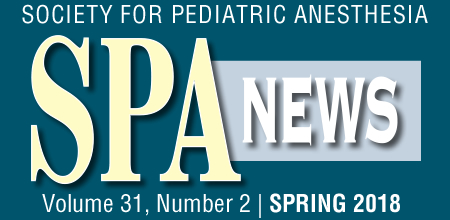Pediatric Anesthesiology 2018 Reviews
Saturday Session V: Is That Even Ethical? Addressing Challenges in Your Anesthesia Practice
Reviewed by Kate Gentry, MD, MA
Seattle Children’s Hospital
Have you ever wondered how you would handle the following?
- In the pre-operative holding area, you meet an 8-year old child crying because of leg pain from her fractured femur. You reach for your syringe of morphine to ease her pain before taking her back to surgery when the parents stop you. “Don’t give her that!” The girl’s crying intensifies.
- The pre-op nurse pulls you aside before you go into see your next patient scheduled for a procedure in Interventional Radiology—her screening urine HCG was positive.
- The ICU team has been struggling to communicate with a family from Ethiopia whose first language is Amharic. Their child is dying and there are no further interventions available that will change his prognosis. The family insists that the team “do everything,” and that the child’s life is “in God’s hands.” The ICU team has been holding care conferences weekly but sometimes the family doesn’t show up, and when they do, they don’t say anything. Everyone involved seems frustrated and distressed.
Ethical quandaries such as these, and some principles and frameworks that help address them, were the topic of the Saturday afternoon session. The session was moderated by Dr. David Waisel of Boston Children’s Hospital and Harvard University. Dr. Waisel is a pediatric anesthesiologist and bioethicist.
The first speaker was Dr. Douglas Diekema, a bioethicist at the Treuman Katz Center for Pediatric Bioethics and a pediatric emergency department physician at Seattle Children’s Hospital. Dr. Diekema’s talk was “When parents and providers disagree: understanding and responding to conflicts in the care of children.”
In the care of children, the principle of beneficence (i.e. doing what is best for the child) most often directs ethical decision-making. In general, it is assumed that parents are best positioned to determine what is in their child’s best interests, which is why parents have the legal and moral authority to make decisions for their children. If a clinician proceeds to treating a child without the parents’ permission, the clinician has committed a battery.
But what if it seems like the parents’ decision will seriously harm their child? What if the parents are refusing a life-saving treatment? In these cases, the physician needs the support of the state (either via Child Protective Services or a court order) to legally provide medical care. Dr. Diekema spoke about the “harm principle” as a guide for these difficult situations.
According to the harm principle, state interference with parental decision-making is appropriate if the following criteria are fulfilled:
- The parents’ action places the child at significant risk of serious harm.
- Interference is necessary to prevent the harm, is likely to prevent the harm, and is not associated with similar risk of similarly serious harms.
- No less intrusive alternatives exist.
- It passes the test of generalizability—you would feel the same way if the parents were from a different demographic group.
- It passes the test of publicity—others would agree it is reasonable.
Dr. Diekema then raised the question of whether religious objections are any different, or hold any more moral weight, than other types of objections. He stated that while a religious objection may be easier to understand, and may change how you talk to the family, religious objections do not hold more ethical weight than other objections. What matters is the degree and imminence of harm to the child.
A related but different issue that Dr. Diekema addressed was that of parental requests for medical care that you think is inappropriate or unnecessary. To treat a child, you still need the parents’ permission, but you are not bound to provide all the care that they request. By not complying with parental requests you feel are inappropriate, you would not be committing a battery. Dr. Diekema suggests that some requests can be accommodated when:
- The intervention will not hurt the child
- The intervention will not significantly harm others
- The potential for benefit is possible but has not yet been established
A key point in handling all conflicts between parents and providers is to “diagnose” the cause of the disagreement. Often, understanding why parents object to a certain treatment goes a long way to helping resolve the disagreement. In the case scenario of parents not allowing their child with a femur fracture to receive opioids, you might discover that the parents are fearful of any medication that is considered “mind-altering.” Or, they may have a family member who is addicted to opioids. Once their fears are understood, you can have a productive conversation about their refusal and likely reach an agreement about the pain management plan.
The next speaker was Dr. Alyssa Burgart, an anesthesiologist and bioethicist from Stanford University and the Stanford Center for Biomedical Ethics. Her talk was entitled “Don’t talk to me like a child! Pre-op ethical issues with teenagers.”
Dr. Burgart’s learning goals for the audience were:
- To describe adolescent rights that may impact anesthetic care,
- to appreciate the elements of adolescent assent/consent and its relationship to parental consent/permission, and
- to develop skills for gathering and/or disclosing sensitive information from/to teens.
While the ethical principle that underpins the care of young children is beneficence, as children mature, the principle of respect for autonomy gains more relevance. There is often a tension between wanting to respect an adolescent’s emerging autonomy, and recognizing that adolescents can be poor decision-makers. Dr. Burgart pointed out that in adolescence, biologic maturity outpaces psychological and emotional maturity. Furthermore, adolescence is a time of rapid neuroplasticity, and imaging studies reveal that the cerebral cortex is not fully developed until humans are into their twenties. Nonetheless, from a legal standpoint, adolescents become legal adults at the age of 18 years.
Do adolescents have rights? The ethical principle of “respect for persons” is another formulation of respect for autonomy, yet can be more broadly applied, encompassing respect for individuals at different developmental stages and capacities. Dr. Burgart also submitted that adolescents have a right to empathy from healthcare professionals, and when appropriate, they have a right to the support of others who are important to them, such as peers, relatives, teachers, or mental health professionals. So, simply because a teen does not have the legal authority to make his own medical decisions, he has a right to respect, empathy, and support.
When we talk about getting “informed consent” for an adolescent’s procedure, what we are really seeking is permission from the parents, and assent from the teen. The structure of this conversation should be similar to a typical informed consent discussion for adults, with the recognition that different teens may desire different levels of detail and/or responsibility. The teen should have ample opportunity to ask questions and receive answers. This paradigm works well when everyone in the family agrees to proceed with the planned intervention. It becomes challenging when the adolescent refuses, contrary to the parents’ agreement. Dr. Burgart recommends that in this situation, if the case is not emergent, it is best to cancel or postpone the procedure.
The alternative—forcing the adolescent to undergo a procedure against her will—would likely be quite damaging to the adolescent’s relationship with her parents and her trust in healthcare providers. There may be situations—such as urgent or emergent procedures—where there is simply no place for the adolescent to refuse. In cases when you will not consider the teen’s response, don’t ask for their permission. “No one should solicit a patient’s views without intending to weigh them seriously. In situations in which the patient will have to receive medical care despite his or her objection, the patient should be told that fact and should not be deceived.”
Another element of communicating with teens is recognizing their desire for privacy. They may not disclose certain information with their parents in the room. Dr. Burgart recommended that we ask parents to step out during part of the pre-anesthesia discussion so that teens have privacy when answering potentially sensitive questions. Parents may object, but Dr. Burgart suggests that we emphasize the importance of accurate information-gathering in order to develop a safe anesthetic plan, and acknowledge that there is some information teens may not be willing to share with parents. Parents should know that this component of the conversation will remain confidential. Remember, though, that disclosures of abuse or of suicidality necessitate further action/reporting.
Some tips Dr. Burgart offered for talking with teens are: listen attentively; respect privacy and explain confidentiality; solicit information using open-ended, non-judgmental questions; and invite the teen to ask questions. Be prepared for the chance that a positive pregnancy test or revelation of illicit substance abuse may prompt cancellation of surgery. Be ready to answer questions and include the teen in a plan for how to communicate with the parents.
The topics of mature minors, emancipated minors, and certain types of care to which adolescents can consent were also covered. However, the details and implications are so varied by state that I will not summarize them in this article. Dr. Burgart recommended that we inquire at our home institutions if there are decision aids that clarify the situations in which adolescents can consent for their own care.
The last lecture in this series was given by Dr. Joel Frader, a pediatrician and bioethicist from Lurie Children’s Hospital and the Feinberg School of Medicine at Northwestern University in Chicago. In his talk “Beyond Paternalism: Clinician-Parent Communication in the Face of a Child’s Serious Illness,” Dr. Frader reviewed literature on parent-physician communication, and tackled other ethical challenges that arise in the care of critically ill children. His main message was to encourage clinicians to move away from a paternalistic practice of medicine, engage effectively with families, and engage in shared decision-making.
Dr. Frader’s early research described how PICU teams rarely mentioned the families of ICU patients during rounds, the implication being that family preferences were not a prominent component of ICU care. In his research involving families of ICU patients, he found that parents feel “out of control,” terrified of leaving the child’s bedside, and overly dependent on/beholden to physicians.
Dr. Frader presented data from two studies involving the use of family conferences in the ICU. While providers believe that care conferences are valuable as an efficient way to communicate with families, families do not feel so favorably about these large meetings. Dr. Frader’s interpretation is that family conferences address the needs of clinicians but not necessarily families. They are organized at times convenient for clinicians (not for families), clinicians outnumber family members creating an intimidating environment, and clinicians often lack communication skills that could draw out the parents’ point of view. Dr. Frader contends that parents would probably prefer intimate conversations with a single provider, at the bedside, or just outside the patient’s room.
Dr. Frader concluded his talk with a brief discussion of what he called “Unsettled/Unsettling Matters” that arise in the critical care environment. One of these was unilateral decision-making, e.g. a medical team deciding that CPR would be “futile” and therefore “not offering” CPR to a family.
He reminded the audience that there is no universally accepted definition of futility. The concept of futility is that “in the course of a serious or fatal disease a point is reached when medicine can no longer serve any recognizable good for the patient.” Many healthcare providers will consider that interventions such as prolonged mechanical ventilation or ECMO are futile for patients with extremely dire prognoses, but from the family’s perspective, any additional time alive is of value. From their perspective, these interventions are not futile. Dr. Frader was not saying that clinicians should just do whatever the family wants. They should, however, be honest about the range of interventions and be frank about how likely they are to achieve the goals of care. Unilateral decision-making privileges physicians’ preferences over the families, and there is no good justification for that.
Dr. Frader also had some comments about physician “conscientious objection.” He explained that conscientious objection takes advantage of a power imbalance inherent in the physician-patient relationship and is inconsistent with a physician’s fiduciary duty to his patient. If a clinician feels compelled to opt out of some obligations of care, the provider should disclose his/her objections before establishing the clinical relationship, and must provide an appropriate referral in a way that does not compromise the patient’s access to care.
In sum, Dr. Frader encouraged clinicians to move beyond paternalism in clinical encounters by:
- Putting patients/families first
- Be willing to abandon one’s assumptions and attend to evidence
- Assess parents’ preferences for communication style
- Meet parents where they are at (literally)
- Address how families make decisions
- Become responsive to cues you get from family members
- Insist on adequate institutional support for time to have real conversations with families
This session highlighted how frequently ethical questions can arise in pediatric anesthesia practice. I hope the organizers consider making ethics panels a regular part of future SPA meetings.
- Diekema, D. Parental Refusals of Medical Treatment: The Harm Principle as Threshold for State Intervention. Theoretical Medicine 2004; 25: 243-264
- AAP Committee on Bioethics. Informed Consent, Parental Permission, and Assent in Pediatric Practice. Pediatrics 1995; 95(2): 314-17.
- Frader J, Bosk C. Parent talk at intensive care unit rounds. Social Science and Medicine 1981; 15(4) 267-74.
- Frader J, unpublished.
- Michelson K, Emanuel L, Carter A, Brinkman P, Clayman M, Frader J. Pediatric intensive care unit family conferences: one mode of communication for discussing end-of-life care decisions. Pediatric Critical Care Medicine 2011; 12(6): 336-43.
- Michelson K, Clayman M, Haber-Barker N, Ryan C, Emanuel L, Frader J. The use of family conferences in the pediatric intensive care unit. Journal of Palliative Medicine 2013; 16(2): 1595-601.
- Pellegrino E. Futility in medical decisions: the word and the concept. Healthcare Ethics Committee Forum 2005: 17(4): 308-318.






